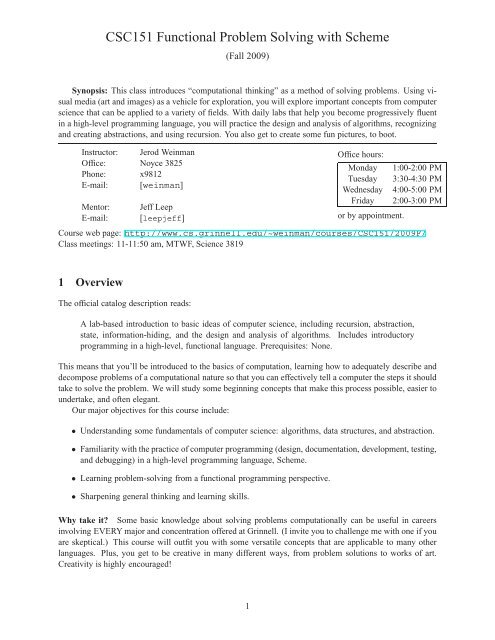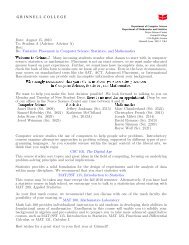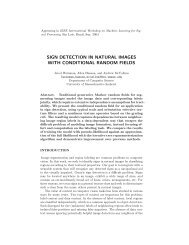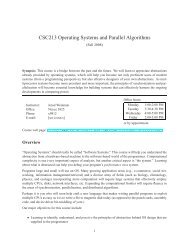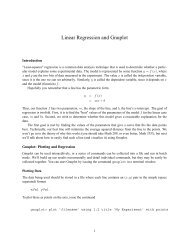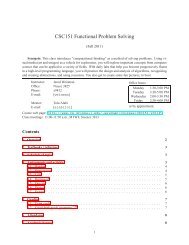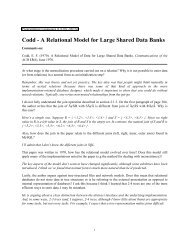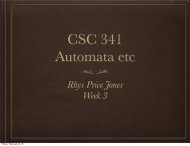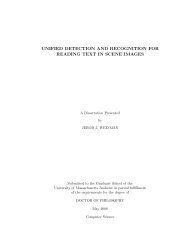CSC151 Functional Problem Solving with Scheme - Computer ...
CSC151 Functional Problem Solving with Scheme - Computer ...
CSC151 Functional Problem Solving with Scheme - Computer ...
- No tags were found...
Create successful ePaper yourself
Turn your PDF publications into a flip-book with our unique Google optimized e-Paper software.
<strong>CSC151</strong> <strong>Functional</strong> <strong>Problem</strong> <strong>Solving</strong> <strong>with</strong> <strong>Scheme</strong>(Fall 2009)Synopsis: This class introduces “computational thinking” as a method of solving problems. Using visualmedia (art and images) as a vehicle for exploration, you will explore important concepts from computerscience that can be applied to a variety of fields. With daily labs that help you become progressively fluentin a high-level programming language, you will practice the design and analysis of algorithms, recognizingand creating abstractions, and using recursion. You also get to create some fun pictures, to boot.Instructor: Jerod WeinmanOffice: Noyce 3825Phone: x9812E-mail: [weinman]Mentor:E-mail:Jeff Leep[leepjeff]Office hours:MondayTuesdayWednesdayFridayor by appointment.1:00-2:00 PM3:30-4:30 PM4:00-5:00 PM2:00-3:00 PMCourse web page: http://www.cs.grinnell.edu/~weinman/courses/<strong>CSC151</strong>/2009F/Class meetings: 11-11:50 am, MTWF, Science 38191 OverviewThe official catalog description reads:A lab-based introduction to basic ideas of computer science, including recursion, abstraction,state, information-hiding, and the design and analysis of algorithms. Includes introductoryprogramming in a high-level, functional language. Prerequisites: None.This means that you’ll be introduced to the basics of computation, learning how to adequately describe anddecompose problems of a computational nature so that you can effectively tell a computer the steps it shouldtake to solve the problem. We will study some beginning concepts that make this process possible, easier toundertake, and often elegant.Our major objectives for this course include:• Understanding some fundamentals of computer science: algorithms, data structures, and abstraction.• Familiarity <strong>with</strong> the practice of computer programming (design, documentation, development, testing,and debugging) in a high-level programming language, <strong>Scheme</strong>.• Learning problem-solving from a functional programming perspective.• Sharpening general thinking and learning skills.Why take it? Some basic knowledge about solving problems computationally can be useful in careersinvolving EVERY major and concentration offered at Grinnell. (I invite you to challenge me <strong>with</strong> one if youare skeptical.) This course will outfit you <strong>with</strong> some versatile concepts that are applicable to many otherlanguages. Plus, you get to be creative in many different ways, from problem solutions to works of art.Creativity is highly encouraged!1
Important WarningsWarning! Experience shows that CSC 151 exercises different parts of your brain than other courses (evenmath and science courses). Expect some difficult times, but have confidence that you can work throughthem and that you’ll come out of the course <strong>with</strong> much more knowledge.Warning! Like learning a foreign language, learning in this course is cumulative: New ideas often build onideas from earlier in the course. If you feel like you’ve missed something important, please come talkto me ASAP.Warning! <strong>Computer</strong>s have no common sense or compassion. They are complex, and sometimes they dothings we don’t expect. When things go wrong, don’t blame yourself. Ask me or a tutor for help.In addition, we are using software (MediaScript) that has been developed at Grinnell and may still havesome bugs lurking <strong>with</strong>in. It is entirely possible that it may crash for no good reason.2 Textbooks / ReferencesThere is no required textbook for this course, as the material has been written by Grinnell faculty and willbe posted on the web. However, there are some useful textbooks and references you may want to bookmarkor keep handy.BooksDybvig, Kent R., The <strong>Scheme</strong> Programming Language (Third Edition), MIT Press, 2003.http://www.scheme.com/tspl3An effective guide to learning the <strong>Scheme</strong> language.Felleisen, Matthias, Findler, Robert Bruce, Flatt, Matthew and Krishnamurthi, Shriram, How toDesign Programs, MIT Press 2001.http://www.htdp.orgA wonderful guide, particularly for later topics in the course like higher-order programming, re-factoring,and recursion.ReferencesKelsey, Richard, Clinger, William, and Rees, Jonathan, editors, Revised 5 Report on the AlgorithmicLanguage <strong>Scheme</strong>. 1998.http://www.cs.grinnell.edu/courses/<strong>Scheme</strong>/r5rs-html/r5rs_toc.htmlhttp://www.cs.grinnell.edu/~weinman/courses/<strong>CSC151</strong>/doc/r5rs.pdfThe complete, concise definition of the <strong>Scheme</strong> programming language.3 Schedule of TopicsThe following is an approximate schedule of topics to be discussed during the course. See the web pageschedule for details.2
Week Topic Week Topic1 Introduction 8 Geometric art2 Numbers, procedures, graphics 9 Characters, vectors, data structures3 Design, images, color 10 Analysis, testing, association lists4 Documentation and iteration 11 Higher-order procedures, search5 Booleans and conditionals 12 Sorting6 Lists and recursion 13 Objects7 Preconditions, local procedures 14 Files, summary, review4 Assignments and ActivitiesThis class is taught in a collaborative workshop style. Some days we will spend working through problemsor concepts in an interactive fashion. Most days, you’ll work on laboratory problems on the computer <strong>with</strong>other students. We will start many days <strong>with</strong> a quick introductory discussion and end <strong>with</strong> a reflectivediscussion. Participation is KEY!To make class time most valuable for you, I do not plan to lecture on material that is covered in thereading. By reading beforehand, we can concentrate on areas of confusion and highlight the importantconcepts you will be experimenting <strong>with</strong> that day. Because our class time is limited, you should comeprepared to each class.Q: What does it mean to be prepared for class?A: Preparation consists of1. Check the schedule for the day’s meeting to find out the topic.2. Read the assigned material before class.3. Come to class on time, <strong>with</strong> paper and something to write <strong>with</strong>, ready to participate.Under a normal 16 credit load, I expect that you will spend at least (but hopefully more) 40 hours per weekon your studies (class time, homework, and studying). Thus, you should plan to spend 10 hours/week onwork for this course. With class time clocking in at 3 1 3 hours, you should have at least 62 3hours/week leftfor the remaining activities.4.1 ReadingNearly, every day there will be a brief reading assigned. Before each class, you should check the course webpage for assignments. Reading the material may entail the following:Overview You should look over the reading once to get an overview of the material to be covered.In-Depth Next, read the material closely. Perhaps not everything will make sense at this point, but hopefullymost things will. You should try some of the examples in the text as you read.Final Notes After carefully reading the material, try making a few notes to yourself about what you thinkare the most important concepts being covered, as well as any questions you have.These readings are short, but very important. Some details will make more sense as you try things out onyour own in lab, but I am always happy to answer your questions.3
4.2 ParticipationBecause much of our work in this course involves collaboration and discussion, you will be evaluated onyour participation.Participating in class involves:• being present in class (physically and mentally)• coming to class on time• coming to class prepared• asking questions when appropriate• making positive contributions to class discussion by volunteering and when called upon• staying on task during lab exercises, and• working effectively <strong>with</strong> your lab partner(s)Students who regularly meet these criteria can expect to earn 90% (i.e., an A-) for their participation grade. Iwill reward students who regularly provide significant insights or guide discussion in productive ways <strong>with</strong> ahigher participation score. Students who fail to participate regularly or who participate in counterproductiveways (e.g., by dominating the conversation or making inappropriate comments) can expect to earn a lowerscore.One unexcused absence will have no effect on your participation score. (See the Attendance Policy,Section 6 below.)4.3 LabsMost class days will involve collaborative laboratory work. You may not always complete the laboratoryassignments during class. It is very important that you finish these outside of class to be sure that you areengaging in all the material we cover. Like playing an instrument or speaking a foreign language, the onlyway to become proficient is to practice, practice, practice! You will be expected to carefully write up yoursolutions to some lab exercises.Lab write-ups will be due at the beginning of the next class session. When a lab is to be written up, Iwill let you know before you start through the course web site.You and your lab partner(s) may submit your write-ups together or individually. If you complete the labon your own, acknowledge your partner in your writeup.Your write-up should include your solution to each exercise in the lab. If the exercise directs you towrite <strong>Scheme</strong> code, include your <strong>Scheme</strong> code. If the exercise directs you to find out what the output ofsome expression is, copy and paste the output from the MediaScript console. If the exercise asks a questionor asks you to explain something, write an answer in English. You do not need to copy the entire lab intoyour write-up (in fact, please don’t!), but include the problem number for each exercise.Send your lab write-up to me in the body of an email (do not send an attachment) by the beginning of theclass day. The subject of the email should be of the form "CSC 151-02 Lab: Title of Lab". In general, I willreply to your email only to acknowledge its receipt. In certain circumstances, I may offer some feedback.Lab write-ups will be graded on a binary scale, 0 or 1. You will earn a 1 if your write-up includes asolution or evidence of serious effort for each exercise in the lab, and a 0 if the write-up was not turned inor if some exercises are not attempted. If you were not able to complete some exercises because of theirdifficulty, you can still earn full credit by explaining where you got stuck and coming to talk <strong>with</strong> me assoon as possible.In short, every diligent student should earn full credit for lab write-ups.4
4.4 HomeworkA homework assignment is due each Wednesday (when there is no project or exam). The homework isintended to let you learn and apply some new algorithms and ideas, rather than merely checking that you’velearned the basic concepts (as the quizzes do). However, they are not intended to be huge undertakings. Ifyou find the assignments are consistently taking longer than 3-4 hours, please talk to me.I will give you instructions about what forms of collaboration are permitted on each homework assignment.Since I want to give you room to go above and beyond the requirements of the assignment, homeworkwill be graded on a simple ternary scale:̌+ Exhibits exceptional insight and/or craftmanship̌ Meets the requirements of the assignment.̌− Does not meet the requirements of the assignment.I expect most work to receive checks (̌). Of course, no credit will be given if nothing is submitted.The course schedule includes 8 homework assignments; your lowest homework grade will be dropped.4.5 QuizzesEach Friday, there will be a short, written quiz covering one or two key ideas from the previous week. Sincelab work is done in pairs, the quizzes are intended to check each individual student’s understanding of theseideas in a timely fashion (i.e., well before the examinations). If you (or the class as a whole) are missing akey concept, I want to revisit that concept as soon as possible so we can build on it in later lessons.The course schedule includes 12 quizzes; your lowest quiz grade will be dropped. Since the goal of thequizzes is to check that you have learned basic skills, an answer that is basically correct will receive fullcredit, even if there are minor issues. For code, my rule of thumb is that the code is basically correct if Ibelieve you could make it work in a few minutes at the computer (and it uses the required ideas). A partiallycorrect answer will receive partial credit at my discretion.If you require accommodations for these quizzes, please come talk <strong>with</strong> me as soon as possible. Thefirst quiz will be the second Friday of the semester.4.6 ProjectThe course will also include one more substantial project, in which you will have an opportunity to exerciseyour creativity in working on a program over two weeks. I will inform you of the grading rubric when theproject is assigned on Wednesday, November 11. Project due date: Tuesday, November 24.4.7 ExamsAs opportunities for you to demonstrate your programming and design prowess, there will be three takehomeexams, and an optional final exam.Exam 1Exam 2Exam 3Final ExamWednesday 23 SeptemberWednesday 4 NovemberTuesday 8 DecemberWednesday 16 December (9 am)You should find they challenge you to go beyond what we have done in class.Take-home exams are open notes, open computer, and open instructor. However, because I intendthe exams to assess your own individual understanding of the material, collaboration on exams is notpermitted. You should not talk to anyone (except me) about take-home exams before they are due. Youshould not discuss the problems on the exam, nor your answers. You should not give any information5
about your progress on the exam (e.g., which problems you have completed or which you found difficult),and neither should you ask others about their progress. If you have any doubt about what is and is notpermissible, ask the instructor.The final exam can be used to replace your lowest score on one other examination. Although the finalfor this class is optional, you may in fact wish to take it. Therefore I encourage you not to make airlinereservations that will conflict <strong>with</strong> your final exam schedule.The final will be an in-class exam. Talking <strong>with</strong> other students during the exam will not be permitted.You may ask me questions. The exam will be closed-book and closed-computer, but you will be allowed touse one double-sided, 8.5"x11" sheet of hand-written notes.5 GradingMy goal is for everyone taking this course to be able to demonstrate familiarity, fluency, and excellence <strong>with</strong>the course concepts. I would be very happy if you all met the goals above and received “A”s. The followingweighting of individual activities will provide a basis for evalution,5.1 Extra CreditParticipation 10%Homework 20%Project 10%Quizzes 20%Exams 30%Labs 10%Successfully undertaking an activity for extra credit will add 1/2 of a percentage point to your final score.I will propose opportunities for extra credit throughout the semester, and you may propose ideas as well. Imay limit this form of extra credit to 4 points.5.2 Good-Faith Grade Guarantee TMBecause I realize that computer science does not “click” will all students, I reward effort as well as outcome.Hence, students who make a good faith effort in this class will pass the class <strong>with</strong> at least a C+. A good-faitheffort includes:• missing no more than two classes,• turning in every homework assignment, and• spending the requisite time on each examination.6 Attendance PolicyI know that sometimes “things happen.” Therefore, you will be granted one unexcused absence from class<strong>with</strong> no penalty for participation. However, this is an intensively collaborative lab-based course, and yourpresence is integral to your learning. Therefore, the following will be deducted from your participationgrade:2-4 absences 20%5-7 absences 40%8 or more absences 80%6
If you wish me to acknowledge your absence as excused, you must either:1. Notify me at least 7 days in advance to make suitable arrangements for your absence, or2. Provide me <strong>with</strong> documentation of your absence’s circumstances post hoc from Health Services orStudent Affairs.If you do miss a class, you must first talk to a classmate about any material that you may have missed. Afterthat, you may follow up <strong>with</strong> me about any further questions or concerns.You should complete the lab assigned for any days you are absent and be sure you understand thematerial. See the late policy below on missing class during homework or quiz days.7 Academic HonestyYou, as students, are members of the academic community. Both the College and I expect the higheststandards of academic honesty. (See the Grinnell College Student Handbook, e.g.,http://www.grinnell.edu/offices/studentaffairs/shb/section3/academichonesty).Among other things, this means clearly distinguishing between work that is your own, and work that shouldbe attributed to others. This includes ideas and examples that you draw from labs and readings.It is expected that the collaboration policies given in this syllabus and on particular assignments will befollowed. When you explicitly work as part of a group or team, you need not identify the work of each individual(unless I specify otherwise). Furthermore, any program results or output must be faithfully recorded,not forged. (A thoughtful explanation of unexpected behavior can often be a worthwhile submission and ismuch better than the alternative.)You should never “give away” answers to homework assignments or examinations. You may, however,work together in developing answers to most homework assignments. Except as specified on individualassignments, each student should develop his or her own final version of the assignment. On written assignments,each student should write up an individual version of the assignment and cite the discussion.On non-group programming assignments, each student should do his or her own programming, althoughstudents may help each other <strong>with</strong> conceptual design and later debugging. When working on examinations,you should not use other students as resources.As an instructor, I will meet my obligation to bring any work suspected to be in violation of the College’sAcademic Honesty Policy to the attention of the Committee on Academic Standing, after which there is norecourse <strong>with</strong> me.8 DeadlinesWork is due at the time and date specified in the assignment. Each weekday (M/T/W/Th/F) your work islate will reduce your grade by one level (exams excluded). Work must still be submitted by the due date ifyou have arranged a prior excused absence.Because I am concerned about your health and well being, I will also accept late work if1. you start the assignment at least three days in advance of the due date;2. you get to sleep by midnight the night before the assignment is due;3. you expend a reasonable amount of effort to complete the assignment by midnight;4. you turn in a letter attesting to facts 1, 2, and 3 when the assignment is due; and7
5. you talk to me ASAP about any problems you’ve had on the assignment.Deadlines for assignments involving programming will automatically be extended by at least one classperiod if MathLAN is down for an unscheduled period of 3 or more hours during the two days preceding theassignment due date.Absolute deadline: All homework must be submitted by Friday, December 11 at 5 p.m.9 Getting HelpThe Math Lab makes tutors for 151 available for help in the open laboratory, SCI 3815. These tutors canbe found at regularly scheduled times, which are posted on the front door. Our student tutors may also beavailable for regular, more intensive one-on-one tutoring. As the course gets underway, please let me knowif you are interested.Of course, you can also get help from me. Please come by during my office hours to discuss the coursecontent, get any extra assistance, or just talk about how the course is going. Note that if multiple studentshave similar questions or issues, we may work together as a group. If you cannot attend a scheduled officehour, you may also email me to schedule an appointment; please include 3-4 possible meeting times so thatI can pick one that works for me.I enjoy getting to know my students, but I prefer to reserve office hours for academic matters. If youwould like to have a more informal conversation, I would be delighted to accept an invitation to lunch(http://www.grinnell.edu/offices/studentaffairs/chaplain/religousandspiritualprograms).Email is also a reliable way to contact me, but please allow 24 hours for a response (except on weekends,when I do not regularly read email). You may also call me in my office (x9812) for more urgent matters(e.g., you will be missing a lab due to illness).10 AccommodationsIf you have any disability that requires accommodations, please meet <strong>with</strong> me right away so that we can worktogether to find accommodations that meet your learning needs. You will also need to provide documentationof your disability to the Dean for Student Academic Support and Advising, Joyce Stern, located on the 3rdfloor of the Rosenfield Center (x3702).Thanks to Janet Davis, Sam Rebelsky, and Henry Walker for many elements of this syllabus.8


